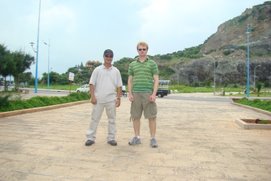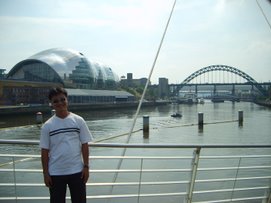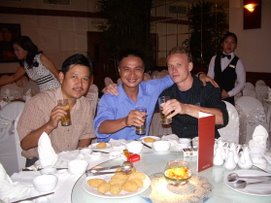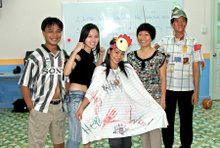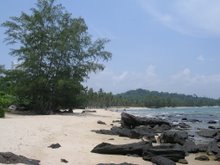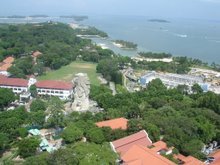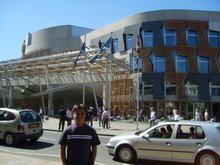
VIETNAM (source: the Economist, 2004)
Area: 331,114 sq km
Capital: Hanoi
Arable as % total land: 18
Currency: Dong (D)
People
Population: 79.2m
Pop. per sq km: 239
Av. ann. growth in pop. 2000-05: 1.35%
Pop. under 15: 33.4%
Pop. over 60: 7.5%
No. of men per 100 women: 99
Human development index: 68.8
Life expectancy: men: 66.9 years, women: 71.6 years
Adult literacy: 93.6%
Fertility rate (per woman): 2.3
Urban population: 24.5% per 1000 pop.
Crude birth rate: 19.7
Crude death rate: 6.4
The economy
GDP: D484 trn
GDP: $32.7 bn
Av. ann. growth in real GDP 1991-2001: 7.7%
GDP per head: $410
GDP per head in purchasing power parity (USA=100): 6.0
Economic freedom index: 3.70
Origins of GDP (% of total)
Agriculture: 23.6
Industry, of which: 37.8
Services: 38.6
Components of GDP (% of total)
Private consumption: 65.0%
Public consumption: 6.2%
Investment: 28.9%
Exports: 55.3%
Imports: -57.3%
Structure of employment (% of total)
Agriculture: 70
Industry: 13
Services: 17
Energy (m TOE)
Total output: 46.3
Total consumption: 40.0
Consumption per head, kg oil equivalent: 471
net energy imports as % of energy use: -25%
Inflation and finance
Consumer price inflation 2002: 3.9%
Av. ann. inflation 1996-2002: 2.8%
Treasury bill rate, 2002: 5.92%
average annual increase 1996-2001
Narrow money (M1): 27.4
Broad money: 34.5
Balance of payments, reserves and debts, $bn
Visible exports fob: 15.0
Visible imports fob: -14.5
Trade balance: 0.5
Invisibles inflows: 3.1
Invisibles outflows: -4.2
Net tranfers: 1.3
Current account balance: 0.7
- as % of GDP: 2.1
Capital balance: 0.4
Overall balance: 0.2
Challenge in reverses: o.3
Level of reverses end Dec. 3.8
No. months of import cover: 2.4
Foreign debt: 12.6
- as % of GDP: 41
- as % of total exports: 76
Debt service ratio: 7
Vietnam, a one-party communist state, has one of south-east Asia's fastest-growing economies and has set its sights on becoming a developed nation by 2020.
It became a unified country in 1976 after the armed forces of the communist north had seized the south of the country in the previous year.
This followed three decades of bitter independence wars, which the communists fought first against the colonial power France, then against US-backed South Vietnam. In its latter stages, this conflict held the attention of the world.
Overview
The US had entered hostilities to stem the "domino effect" of successive nations falling to communism.
The jungle war produced heavy casualties on both sides, atrocities against civilians, and the indiscriminate destruction and contamination of much of the landscape.
A visit to Vietnam by US President Bill Clinton in November 2000 was presented as the culmination of American efforts to normalise relations with the former enemy.
Vietnam struggled to find its feet after unification and it tried at first to organise the agriculture-based economy along strict collectivist lines.
But elements of market forces and private enterprise were were introduced from the late 1980s and a stock exchange opened in 2000.
Foreign investment has grown and the US is Vietnam's main trading partner. In the cities, the consumer market is fuelled by the appetite of a young, middle class for electronic and luxury goods. After 12 years of negotiations the country joined the World Trade Organization in January 2007.
But the disparity in wealth between urban and rural Vietnam is wide and some Communist Party leaders worry that too much economic liberalisation will weaken their power base and introduce "decadent" ideas into Vietnamese society.
Vietnam has been accused of suppressing political dissent and religious freedom. Rights groups have singled out Hanoi's treatment of ethnic minority hill tribe people, collectively known as Montagnards.
Leaders (Till June 29th 2007)
President: Nguyen Minh Triet
Parliament confirmed Nguyen Minh Triet, the head of the Communist Party in Ho Chi Minh City, as president in June 2006. He has a reputation for fighting corruption and is seen as an economic reformer.
The former head of state, Tran Duc Luong, had submitted his resignation alongside the prime minister and the chairman of the National Assembly. The change of guard had been expected.
Secretary-general of the Communist Party: Nong Duc Manh
The Communist Party holds the real power in Vietnam. It reappointed Nong Duc Manh as its secretary-general in April 2006.
Mr Manh, who is seen as a moderniser, urged Vietnam to speed up economic reforms and to tackle bureaucracy and deep-rooted corruption.
He says he wants to "lift people from poverty and hunger" and to turn Vietnam into a developed, industrialised country.
Mr Manh began his first term in 2001, becoming the first secretary-general with no direct experience of the struggle for independence. He oversaw five years of strong economic growth.
The Communist Party leadership recommends candidates for the posts of president and prime minister.
Prime minister: Nguyen Tan Dung
Foreign minister: Pham Gia Khiem
Defence minister: Phung Quang Thanh
Finance minister: Vu Van Ninh
Media
The Communist Party has a strong grip on the media. The Ministry of Culture and Information controls the press and broadcasting.
The government has shut down several publications for violating the narrow limits on permissible reporting. Under a 2006 decree journalists face large fines for transgressions which include denying revolutionary achievements and spreading "harmful" information or "reactionary ideology".
Internet providers face fines or closure for breaking the rules and "cyber dissidents" have been imprisoned.
There are hundreds of newspapers and magazines, but television is the dominant medium. Vietnam Television (VTV) broadcasts from Hanoi and is available via satellite to the wider region. There are many provincial stations. Some foreign channels are carried via cable.
State-run Voice of Vietnam (VoV) operates national radio networks, including the VoV 5 channel with programmes in English, French and Russian.
The press
Nhan Dan - Communist Party daily, English-language pages
Vietnam Economic Times - English-language pages
Le Courrier du Vietnam - French-language
Vietnam News - English-language daily
Quan Doi Nhan Dan - People's Army daily
Television
VTV - Vietnam Television
(BBC)



.bmp)







